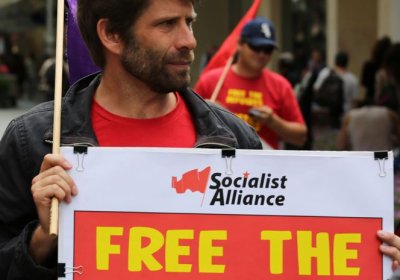It seems that everyone in Australia can now agree that a class war has erupted. Former Labor Party leader Simon Crean, recently sacked by Prime Minister Julia Gillard said: “The Labor Party has always operated most effectively when it has been inclusive, when it’s sought consensus, not when it has sought division, not when it has gone after class warfare.”
Australia
The ongoing strike at Sydney University attracted national media attention on March 26 when strike-supporting students were dragged from a lecture theatre by riot police.
The students were engaged in a “roaming picket” that was disrupting one of the few remaining classes held that day when police intervened. This sparked debate as to whether student supporters used appropriate tactics to make their presence heard.
Socialist councillor Sam Wainwright has vowed to run a fierce campaign for the seat of Fremantle aimed at winning public support for confiscating the wealth of the mining billionaires and the big banks.
“The mining boom reveals starkly the manifest inequality of capitalism in Australia today,” Wainwright told Green Left Weekly.
“On the one hand, we have Gina Rinehart — who has become the richest person in Australia — and on the other hand we have homeless people on the streets of Fremantle.
When the Murdoch-owned Australian starts attacking students who took to the streets on March 27 as part of the National Union of Students’ (NUS) protest for free education, it is evidence that student activism makes conservatives very nervous.
“While ALP politicians are fleeing in terror from factional and media accusations about using ‘class war rhetoric’, the reality is that there is an ongoing class war that is about to be dramatically escalated if Abbott wins the September 14 elections,” says Peter Boyle.
Boyle was preselected on April 3 by the Socialist Alliance to run in the federal seat of Sydney. He is a national co-convenor of the Socialist Alliance and has been an active socialist since the early 1970s, becoming radicalised around war, race and class issues.
He has two daughters and two grandchildren.
A capacity crowd of about 350 people filled the room for the opening night of the Marxism 2013 conference in Melbourne on March 28.
The forum, called "Uniting the left to resist austerity, war and crisis", heard from six speakers, including Australian unionist Bob Carnegie, striking airline union PALEA president Gerry Rivera, US teacher and socialist Brian Jones, Socialist Alliance co-convener Peter Boyle, Socialist Alternative national executive member Vashti Kenway, and the Revolutionary Socialist Party's (RSP) Kim Bullimore.
A protest was held outside the Department of Foreign Affairs and Trade in Sydney on March 19, to oppose the controversial state visit by the Myanmar president Thein Sein.
Prime Minister Julia Gillard met with Thein and announced a $20 million two-year aid program, as well as the posting of a resident military attache and a trade commissioner in Yangon.
Protesters representing the Rohingya, Karen and Kachin communities demanded the Australian government address the gross human rights abuses before business and military deals are made.
Photos by Peter Boyle.
The National Tertiary Education Union (NTEU) at the University of Sydney is involved in an industrial battle with the administration over pay, conditions and casualisation.
As part of this campaign, the union held a 24-hour strike on March 6. Staff and students held pickets outside all campus entrances, and the university was largely shut down for the day.
The multiple picket lines converged on the main entrance to the university for a midday rally, which attracted hundreds of staff and supporters. There were many speakers including unionists, student representatives and the Greens.
A landmark ruling in Sydney on February 15 gave the biotechnology industry an unprecedented right to make huge profits from genetic testing.
The case involved the breast cancer genes BRCA 1 and BRCA 2 and the right of US biotechnology company Myriad Genetics to have exclusive licence to a patent over their use in research.
Federal Court Justice John Nicholas had ruled that a private company can continue to hold a patent over an isolated gene, in this case, the BRCA gene. The BRCA gene is responsible for repairing or removing defective DNA cells.
Do oil spills make good economic sense? A witness called by Canadian firm Enbridge Inc— which wants approval to build a $6.5 billion pipeline linking Alberta’s tar sands with the Pacific coast — told a recent hearing in British Columbia that the answer is yes.
Over the past year, we have seen a huge rise in activity around women’s rights in Australia and other parts of the world.
Attention has turned to a range of horrific individual tragedies as well as broader issues, including sexual assault and violence against women, the disparity in income between men and women, and a debate about misogyny.
Although the idea that feminism is no longer relevant still dominates, women know through experience that sexism is rife. They are learning to organise together and taking to the streets in large numbers to demand change.
- Previous page
- Page 663
- Next page









